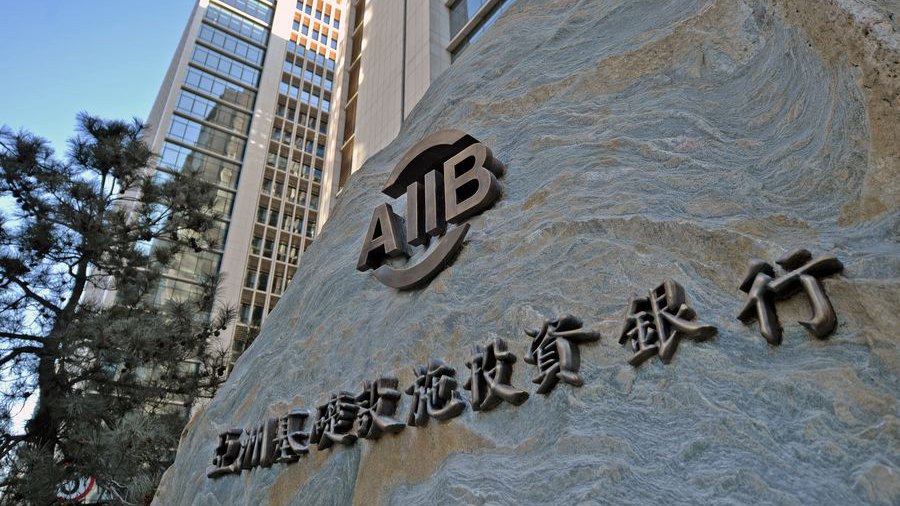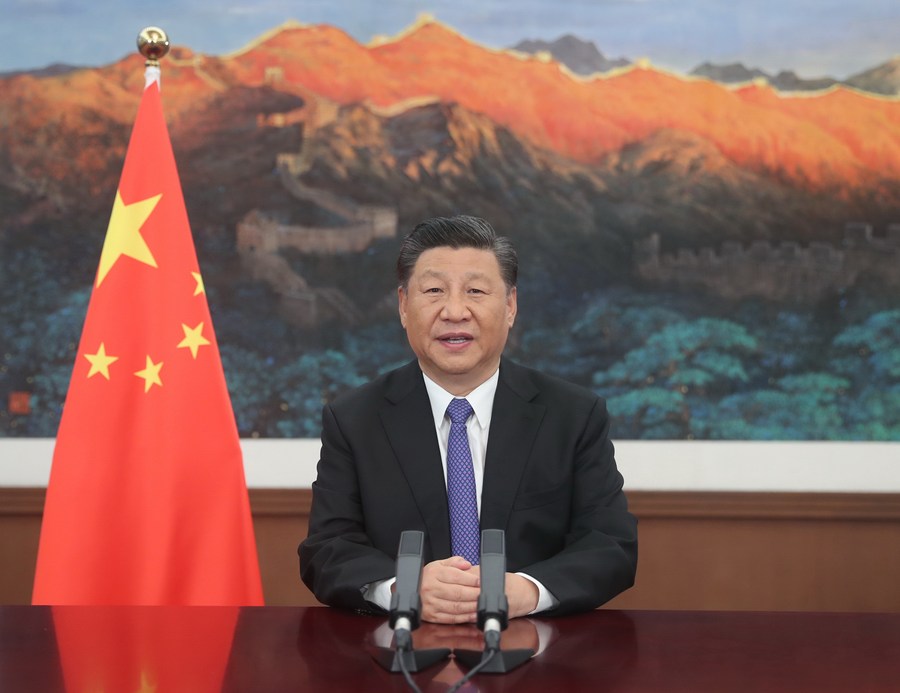
The sign of the Asian Infrastructure Investment Bank (AIIB) in Beijing, capital of China. /Xinhua
The sign of the Asian Infrastructure Investment Bank (AIIB) in Beijing, capital of China. /Xinhua
Editor's Note: Ken Moak, who taught economic theory, public policy and globalization at the university level for 33 years, co-authored a book titled "China's Economic Rise and Its Global Impact" in 2015. The article reflects the author's opinion, and not necessarily the views of CGTN.
Chinese President Xi Jinping's call last Tuesday for promoting the Asian Infrastructure Investment Bank (AIIB) to become a "new type" of multilateral development bank to "promote development for all of its members and build a community with a shared future for mankind" is a good thing. The AIIB would effectively complement or compete with the International Monetary Fund (IMF) and World Bank (WB).
Either way, the AIIB will add more financial resources to promote global economic development, accelerating world recovery from the COVID-19 induced recession. With an alternative source of funds, the IMF and WB will be forced to rethink their loan conditionality, focusing on development and abandoning the promotion of U.S. liberalism. This would improve the efficiency and stability of the international financial system.
The AIIB was proposed by President Xi in 2013 and launched in 2016 with 57 founding member countries and 100 billion U.S. dollars in registered capital. Since then, the membership number grew to 100 in July 2019. Most major economies, except for the U.S. and Japan, have either joined or expressed interest in joining the bank because of its potential benefits.
The massive numbers of infrastructure and climate change-related projects needing to be funded and built will benefit all members around the world. The investing or lending countries will benefit from accessing the emerging markets and gaining new infrastructure contracts. The borrowing nations will also increase economic development and growth through the projects.
The Asian Development Bank estimates that Asia alone will need 1.7 trillion U.S. dollars for infrastructure construction per year between 2016 and 2030. Adding Latin America, Africa, Central and Eastern Europe to the portfolio, annual investment funds in these projects could be doubled.
Judging from many AIIB projects in countries such as India and Turkey, the "new type" AIIB could bring boundless opportunities to the world. As far as I can tell, these projects brought new hope to the recipient nations without sinking them into a "debt trap."
The 2018 Andhra Pradesh Rural Roads Project, for example, improved rural connectivity, increased economic growth and provided the local rural residents a better life in that part of India. The increase in economic activities also generated sufficient revenue to repay their loans.
The impact of the AIIB's new mission on the global economy could be boundless. Xi's proposal of making the AIIB a multilateral development bank that promotes global development would also be a refreshing and much needed change to the current international financial systems. The IMF and WB didn't function well for the developing economies, as were the cases in Argentina, Thailand and other nations needing IMF or WB loans.

Chinese President Xi Jinping addresses the opening ceremony of the fifth annual meeting of the Asian Infrastructure Investment Bank (AIIB) via video link, in Beijing, capital of China, July 28, 2020. /Xinhua
Chinese President Xi Jinping addresses the opening ceremony of the fifth annual meeting of the Asian Infrastructure Investment Bank (AIIB) via video link, in Beijing, capital of China, July 28, 2020. /Xinhua
The IMF and WB were intended to be development banks, but the U.S. hijacked their original mandate, insisting that they should be operated as commercial banks mainly to avoid financial risks. The IMF and WB were required to impose harsh financial and ideological loan conditions, requiring borrowing nations to ban deficit financing and adopt neoliberalism, particularly the kind of the U.S.
However, barring borrowing nations from deficit financing during periods of economic downturn has worsened their economic problems because declining economic activities led to falling revenues. In order to balance the budget, they must reduce spending or increase taxes, forcing governments and/or consumers to reduce spending.
Through the multiplier mechanism, cutting government spending or increasing taxes reduces economic activities more than spending cuts. This was predicted by the late British economist John Maynard Keynes' theory of the "paradox of shift," stating an increase in autonomous saving leads to a decrease in aggregate demand and thus a decrease in gross output which will in turn lower total saving.
History proves Keynes is right. The Great Depression in the 1930s was, in part, attributed to government spending cuts. Similar occurrences happened in the post-2008 financial crisis period. By requiring Greece and other EU borrowing countries to cut spending, the European Central Bank exacerbated their economies and financial woes, increasing the government spending/GDP ratio and pushing them into a recession. The economic plight forced many unemployed (Portuguese and Spanish) youths to seek employment prospects in their former colonies.
Reforming the AIIB is therefore a welcome sight, as it could improve nations to help each other so as to promote economic development and bring enormous benefits. Growth in the developing nations will afford them to buy more exports from their developed counterparts, improving the latter's economic prospects. What is more, payment defaults would also be minimized if not avoided because the borrowing nations would be able to generate sufficient income to repay the loans. This is a "win-win-win" situation.
Focusing on development and not on loan repayment, too, has spillover benefits, including the sustaining of an efficient international financial system. A growing economy with the sustained ability to generate the necessary revenue is the most effective and realistic approach to service its debt obligations.
Another positive effect of reforming the AIIB is the rise of other currencies such as the yuan and euro as the world's reserve currency, perhaps equaling the U.S. dollar. This is a good thing because it would minimize the U.S.' hegemonic power and increase global geo-economic stability. At the very least, it could render U.S. sanctions and extraterritoriality ineffective in intervening in other countries' internal affairs or damaging the economy.
(If you want to contribute and have specific expertise, please contact us at opinions@cgtn.com.)